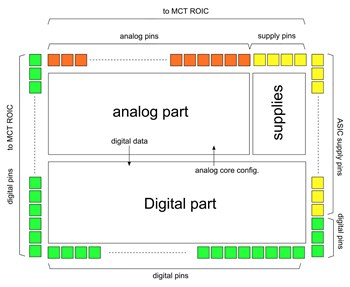The European consortium formed by the company Caeleste (Belgium), Easics (Belgium) and SELEX Galileo (United Kingdom) won the European Space Agency's call for tender AO/1-6814 Development of Prototype ASIC for Large Format NIR/SWIR Detector Array.
The ASIC is targeted for use in future Space Science and Earth Observation missions. The 18 month development aims to design an ASIC dedicated to large format cryogenic NIR/SWIR Detector. The complex presents several challenging features:
- 77K operation temperature
- Radiation hardness
- Fully programmable sequencer on chip
- 16bits analog to digital conversion chain
 ASIC design dedicated to large format cryogenic NIR/SWIR Detector.
ASIC design dedicated to large format cryogenic NIR/SWIR Detector.
The project will benefit from the experience of each consortium partner. Caeleste is responsible for the project supervision and the design of the analog section. Easics is designing the digital section using IMEC standard DARE library for radiation hardness. Easics is also in charge of the test system development. SELEX Galileo joins as IR/cryogenic expert and will provide support for cryogenic operation, test and evaluation.
Following the successful completion of this demonstrator phase, an industrialized version will be envisaged, aiming at providing such flexible and standard ASIC to European Companies willing to simplify the design of infrared instruments for space application.
About Caeleste
Caeleste is designer and supplier of custom CMOS image sensors, and specializes in high performance applications in the field of space, medical and scientific imaging. Caeleste was founded in 2006.
http://www.caeleste.be
About Easics
Easics is a System-on-Chip design company, targeting designs in both FPGA and digital & mixed-signal ASIC technology. Easics designs reliable and scalable high-performance and low-power embedded systems for leading product companies active in wireless & wired communication, medical, industrial, aerospace, imaging, multimedia and measurement equipment. Easics was founded in 1991 as a spin-off of Imec and the University of Leuven (Belgium). Easics is privately owned since 2004. http://www.easics.com
About SELEX Galileo
SELEX Galileo, a Finmeccanica company, is an international defense electronics supplier. The company’s UK-based InfraRed (IR) detector facility has all the equipment and expertise required to design, evaluate, qualify and manufacture IR detectors for a wide range of industrial, military and scientific, space-based applications. http://www.selexgalileo.com